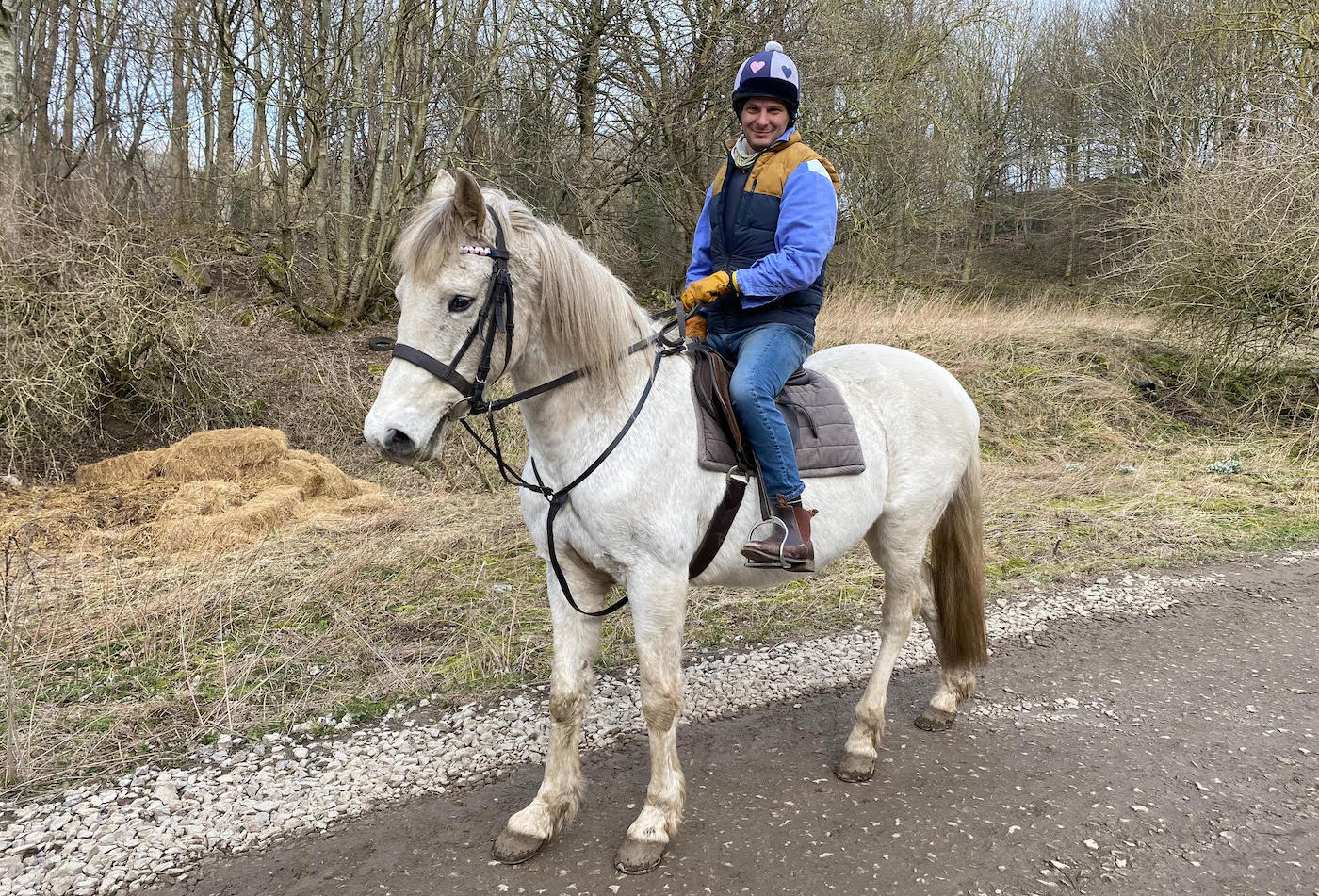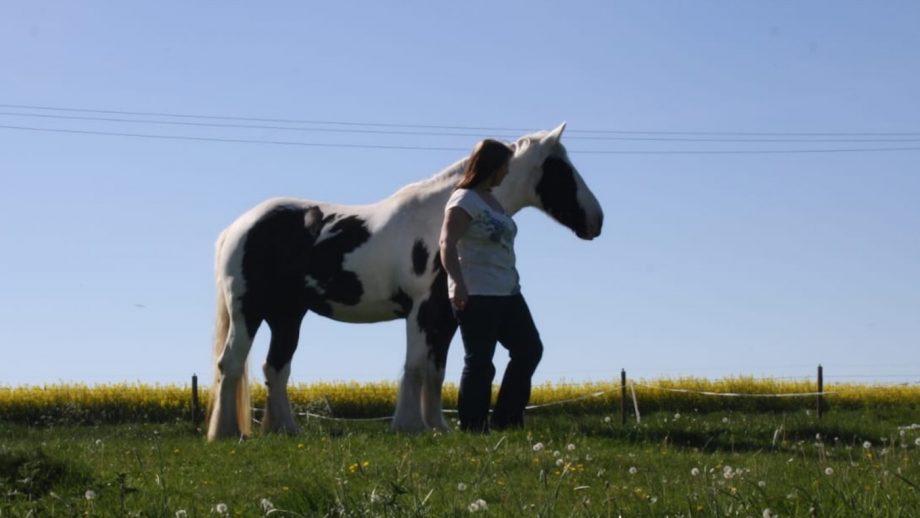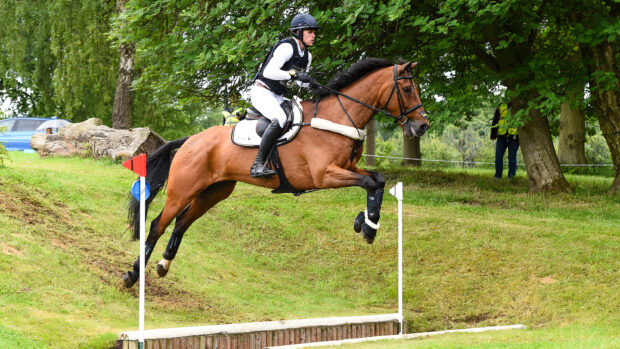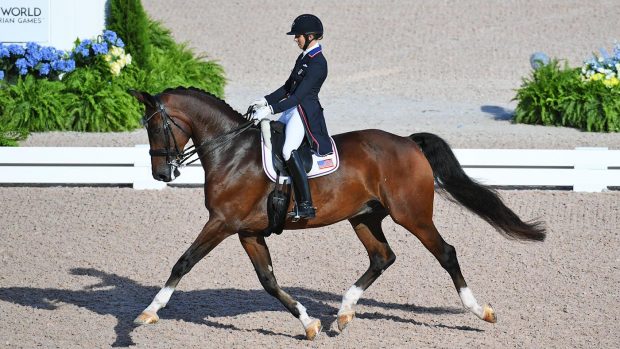A rider who was given two years to live but has since undergone an eight-organ transplant and removal of a 10kg tumour said he is determined to take part in a charity Flat race against all the odds.
Adam Alderson had been put on palliative care owing to the severity of his rare cancer in 2014, and he knew the chances of his survival after the pioneering 18-hour procedure, which involved 30 doctors, were slim.
“But by that point, I was in so much pain, it was just a relief to be without pain,” he said. “If I came out, I did, and if I didn’t, I didn’t.”
Nearly a decade on, Adam is “passionate about showing people how precious every day is, how the body and mind can endure incredible things, and how the spirit of adventure can be a driving force in life”.
Adam had been misdiagnosed with irritable bowel syndrome and was living in Australia with his partner Laura when his pseudomyxoma peritonei was identified. The rare condition is a slow-growing cancer that is difficult to detect, so by the time it is diagnosed, it is often too advanced to treat.
“When I had my first investigation, they said they couldn’t do anything and sent me home,” he said. “We had to pack up and come back [to the UK].”
Adam was referred to hospital, where specialists agreed to try to remove the tumour. But when he came round from the anaesthetic, he was told the cancer had spread too far.
“They said they were sorry but it was everywhere and there was nothing they could do,” he said. “They disconnected my bowel, gave me a bag and a feeding tube and sent me home on palliative care, with a prognosis of two years at best. I was 33.”
Second opinion
Adam had nine months of chemotherapy, while his nutrition was delivered via the feeding tube for 12 hours per day, but his health deteriorated so he discontinued the treatment and went in search of a second opinion.
“But everyone said nothing could be done,” he said. “I went downhill rapidly, in and out of hospital, time in a hospice – then I found a surgeon in Basingstoke called Brendan Moran. I emailed him and he agreed to have a look.”
But the appointment was six weeks away and days later, Adam was taken back to hospital with a major bowel obstruction.
“I was rolling on the floor, throwing up faeces as it had nowhere to go,” he said. “The doctor said ‘We’re nearing the end’, and asked where I wanted to be as it wouldn’t be long. They asked me to sign a do not resuscitate form and I got upset and asked him to contact Brendan and ask if he could see me sooner. He rang them, came back and said ‘They’re ready, we’ll take you now’.”
Adam was taken by ambulance to “meet this lovely man, who was fantastic”.
“Laura and I had decided that if they couldn’t do anything, we’d be done,” he said. “We’d go home and have time together and end my days quietly. They scanned me and Brendan said the tumour was absolutely everywhere, it was too far gone and he couldn’t see a way to remove it. In a last-ditch attempt, I knelt down in front of him and said ‘I’m a proud Yorkshireman and I don’t do this lightly but I’m begging you to try’. And he said ‘There is something’.”
This something was the multi-organ transplant, which had been done before but from which there were no long-term survivors.
“I said ‘Get me on the table’,” Adam said.
He was sent to Oxford hospital, where a specialist team was to carry out the surgery. The procedure had to be authorised, and extensive tests carried out, and Adam was sent home to wait for the results.
“During that week I was very ill and thought I wouldn’t get there,” he said. “Then one morning, in July 2015, I got a call to say they were happy and I could go on the list for organs.
“That was probably the worst day of my life as I was in so much pain. I tried to knock myself out on the wall because it was so unbearable. The GP told Laura that over the next 24 to 48 hours I would slip away; I was going into the final stages of life. It was looking pretty grim.”

Adam with the medics at the Oxford transplant centre
Hours later, the hospital called; a donor had been found. Laura took Adam to hospital.
“The doctors said ‘This is as good as it gets, Adam, let’s go’,” he said. “I signed my life away. In films, that’s the moment everyone’s elated but my thoughts went to the donor; and her family who had made that decision. Then I said goodbye to Laura and off I went.”
The doctors performed the major procedure, replacing Adam’s organs with the donor’s, including her stomach, oesophagus, pancreas and small and large intestines. They removed part of his liver – it has since regenerated – and his gall bladder, spleen and appendix, which were not replaced. He also has his donor’s abdominal wall; the skin can give early clues such as a rash to alert doctors to possible rejection issues, meaning these can be treated sooner.
“Everything was removed; you could see my spine from the front,” he said. “Then they plumbed it all back in. I had a few days in an induced coma, then woke up to Laura in tears, saying ‘We’ve done it, they’ve got it all’.”
Adam was put back to sleep for a while to recover, then came round, “and the hard work began”.
“The next three months were unbelievably tough,” he said. “Every day there was a little problem. I developed a rash as I was rejecting and had to go on medication. They called my family and said ‘This is serious’, but then it seemed to ease. My organs settled, and slowly but surely, the tube came out. I started walking further and after about six weeks I had something to eat, the first thing for nine months. I had an ice cream and it was like beluga caviar.”
Adam praised the Oxford team as “the pinnacle of medical care”, and said it was an emotional day when he went home.
‘Go and live’
“They said: ‘Well done, Adam. Go and live your life’,” he said.
So he did. He and Laura drove a “tiny, battered” Suzuki from Wensleydale 22,000 miles across 18 countries to Russia, and rode tiny motorbikes from Barcelona to Britain, raising funds for Macmillan Cancer Support.
The couple also married, with a lot of Adam’s doctors among the guests, and Adam got back in the saddle; having ridden as a child, he found himself hacking Laura’s 24-year-old retired polo pony. Then, at York racecourse in 2019, when he was presented with a Macmillan award for fundraising, he heard about the Macmillan Charity Raceday at York, on which 12 riders annually take part in a fundraising Flat race.
“I thought ‘I wouldn’t mind a go at that’,” he said. “Covid got in the way but then I got in touch with the trainer Jedd O’Keefe, a lovely man who got me going on their pony, went on the gallops, and to the racing college at Doncaster.”
Adam was also introduced to the “lovely bunch of people” at TopSpec, who made a major donation to his fundraising and have been supporting him towards June’s race.
“But then about three weeks ago, I had a scan that showed the disease has progressed again,” he said. “We knew it was slowly making its way back, which isn’t a massive problem because it’s so slow-growing, but this means we do need to think about a plan, and it has been starting to cause some problems.”
Adam said Dr Moran, a racing fan himself, did not tell him not to do this race but reminded Adam that it would be a lot to ask, after the loss of his core and the peak fitness needed to ride in a race.
“He said I’d get there but I needed more than four months,” Adam said. “I was disappointed and fed up but got my head round it, and spoke to the race organiser who was amazing and said I can defer it till I’m ready, ‘whether that’s next year or the one after; we’ll always be there for you’.”

Adam and his doctors are considering his future options, which might be more surgery, possible laparoscopic to remove the tumour, or even “the whole thing again”, which would be less significant than last time as he is so much stronger now.
“They said I’d breeze through it!” he said. “And if it gets to that, I’ll do what it takes to prolong life a bit longer, I guess. It’s not a cure but it will buy time; I won’t get a full life, whatever, but I’ve already had an extra nine years, which is way more than I thought.”
The other important issue is organ donation; Adam wrote to his donor’s family through the NHS and eventually had a reply from her husband.
“I dropped to my knees when I got it,” he said. “I can’t explain it, I couldn’t read it for tears. I found out who she was and what she did, about her children; it was the loveliest thing to know who that person was, without her I wouldn’t be here and there are two other people living life now because of that one person.”
And Adam added that once someone has stared death in the face, life is changed.
“After a while, you slip back into normal life and it fades away a bit but this has woken me up; things can go wrong and we have to make the most of our lives,” he said.
“I’m going to give myself more time to do this race and not rush but I’ve been loving it, I’ve never been nervous or scared and from the first time on the gallops, it’s felt amazing.”
You might also be interested in:

‘I’d rather ride than have a longer life without horses’: inspirational young rider will not let illness control her life
‘If something does happen, I know I’ve had a fulfilling life; that’s all anyone can ask for’

‘I still ride in my dreams’: rider whose life has been destroyed by motor neurone disease calls for more research funding
“MND has devastated lives for decades — it’s destroyed my life — and it’s something money can help with, but

Subscribe to Horse & Hound magazine today – and enjoy unlimited website access all year round
Horse & Hound magazine, out every Thursday, is packed with all the latest news and reports, as well as interviews, specials, nostalgia, vet and training advice. Find how you can enjoy the magazine delivered to your door every week, plus options to upgrade your subscription to access our online service that brings you breaking news and reports as well as other benefits.




